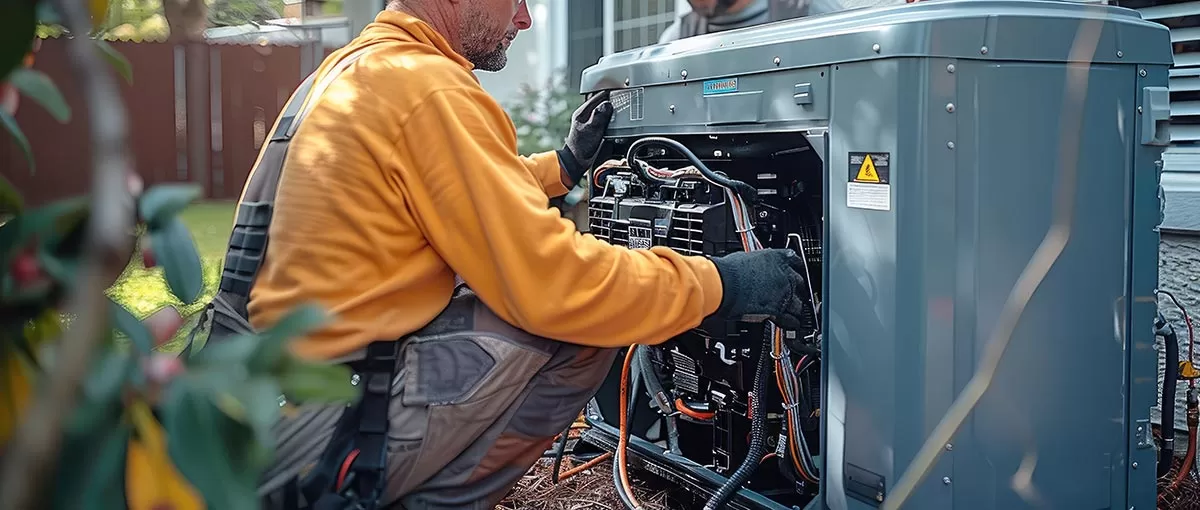A home generator can be a lifesaver when there’s a power outage because it will provide electricity to your home so it can continue to run smoothly, but the installation process can be complex (and even overwhelming) for people who aren’t familiar with it. The first step in the generator installation process is to find the right one for your specific needs. Some of the factors you need to consider include:
- The size of your home.
- The appliances you want to power.
- Your budget.
Once you have found the right generator, you will need to prepare your home for the installation. This can involve getting permits, installing a concrete pad or gravel base, and coming up with the best solution for your generator. The installation process will involve connecting the generator to your home’s electrical system and testing it to make sure it works properly.
Types of Home Generators
There are two types of home generators, with each one having its own advantages and disadvantages. So, the right one for you will depend on your specific needs. The two main types of home generators include the following:
- Standby Generators — These generators are permanently installed outside your home and are directly connected to your home’s electrical system. They’re designed to turn on automatically when there’s a power outage, and they can either power your entire home or a few essential appliances.
- Portable Generators — These generators are smaller, more affordable, and more versatile than standby generators. They can also be moved around, so you can take them with you wherever you go. They can be powered by either gasoline or propane and can power up a few essential appliances or devices.
Before you decide on a home generator, you will need to determine your specific power needs. This will involve making an assessment of your home’s energy consumption and prioritizing essential appliances.

Assessing Household Energy Consumption
You can look at your monthly electrical bill to make an assessment of how much energy you’re consuming. It should give you a monthly average in kilowatt-hours (KWh). You can also use an online calculator to estimate your energy consumption based on the number of appliances and devices you have in your home. Once you have determined your average monthly usage, you should think about any other energy needs you may have during an outage. If you live in an area that’s prone to severe weather, you may need to think about other types of energy use (such as heating and cooling).
Prioritizing Essential Appliances
After you have made an assessment of your energy consumption, you should prioritize any essential appliances that you need to keep running during a power outage. This can include any appliances that are needed for safety, health, and comfort. Some of them can include the following:
- Refrigerator/freezer.
- Sump pump.
- HVAC system.
- Medical equipment.
- Communication devices.
- Lighting.
Once you have made a list of all your essential appliances, you can determine how much wattage is required to power them.
Overview of the Installation Process
Before your home generator can be installed, the following steps must be taken:
- Choosing the right generator — You need to find a generator that can meet your home’s power consumption needs and is compatible with your electrical system.
- Making a site assessment — A qualified installer will assess your property to find the best location for the generator and to make sure it meets all the local code requirements.
- Getting permits — Depending on your location, you may need to get permits from your local government before the installation process can begin.
Once the preparation stage has been completed, the actual installation process can begin. This will usually involve the following steps:
- Preparing the site — The installation team will prepare the site by pouring a concrete pad or by laying a gravel base on which the generator will sit.
- Placing the generator — The generator will be carefully placed on the prepared site and will be secured in place.
- Connecting the generator — The installation team will connect the generator to your home’s electrical system while making sure it’s properly grounded and all the connections are secure.
After the generator has been installed, it will need to be tested. This will make sure the unit is working properly and that it will provide enough backup power when it’s needed. This process usually involves the following:
- Load testing — The generator will be tested under load to make sure it can handle your home’s power needs.
- Transfer switch testing — The transfer switch will be tested to make sure it can switch between utility power and generator power.
- Final inspection — A qualified inspector will perform a final inspection to make sure the installation meets all the local code requirements and the generator is functioning properly.
If you’re looking for one of the best places to install a backup generator in Corpus Christi, be sure to get in touch with Solar Power Integrator.
